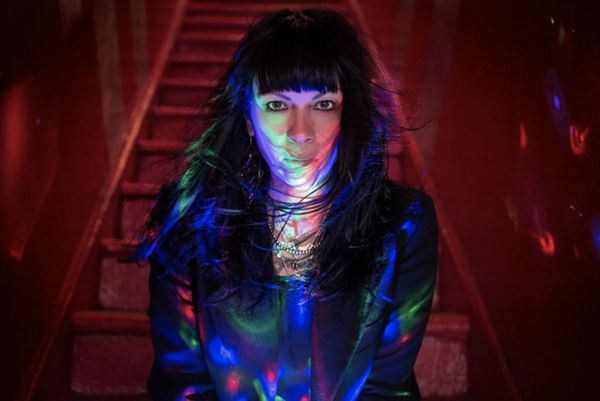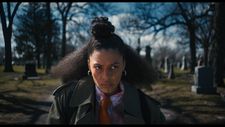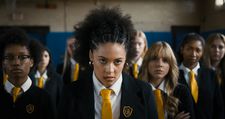 |
| Jennifer Reeder Photo: Courtesy of IFC Films. An IFC Films release |
One of the most consistently innovative directors working today, Jennifer Reeder is promoting her new film, Perpetrator, the complex tale of a teenager who undergoes a strange awakening at the same time as a suspected serial killer is abducting girls in her area – girls whom she is determined to try to track down and help if we can. Jennifer and I have spoken a couple of times in the past, about Knives And Skin and Night’s End, both times at busy festivals. This time things are a little more relaxed. She’s sitting in her study beneath an intriguing painting which, she explains, is a vintage paint-by-numbers piece. “It’s called Tear and it was described as ‘an adolescent girl crying.’ I had to have it.”
It seems an appropriate piece of décor in the context of a conversation which will address the representation of teenage girls in popular culture, the way they are frequently represented as victims and the way that their lives tend to be sanitised. As we begin, I mention that I loved her new film but found myself frustrated by critics who wrote it off as gratuitously gory when, for a lot of girls that age, major aspects of life are defined by blood and gore.
“Oh, absolutely,” she says. “I wanted to make a film that features a very bloody girl. Humans with uteruses, from a very young age, have a very consistent relationship with blood, and at any moment of the month we could wake up and be a one person crime scene, and yet we as a culture do everything to hide that and ignore it. I even think that there's something very kind of gory and gnarly and genre about childbirth, and miscarriage. There's so many bloody aspects to the daily lives of women that are seen as at least secretive, if not fully shameful.
 |
| Perpetrator Photo: Courtesy of Shudder. A Shudder release |
“I think we also learn from a young age to be afraid, and we allow our minds to go to the most horrific pictures of how our lives might end. So I didn't set out to make a film that was really covered in blood, honestly. It’s always surprising when I read a reaction that says it's a really bloody film. I don't know, I just don't see it. I set out to make a film where blood was a character, and that blood had agency. And yet I don't see this film as as gory as it's thought of. I do think that that reaction is an extension of this fear of bleeding women.”
We discuss a scene in the film in which all the girls chant in unison, and what they're chanting, and the way they're doing it, seems to be not only about how women can be powerful, but about how femininity can be powerful, which, I suggest, is a much less common contention.
“I totally agree with that,” she says. “I mean, that is exactly the the sentiment that I have set out for in Perpetrator and in other films leading up to Perpetrator: that femininity, and femaleness, is in itself a kind of superpower. I often find in real life it takes a group of women to give each other that power, to embrace it and launch it out into the world. It's a really productive place for me to exist not only as a woman in this world, but as a female filmmaker in this world who does want to tell stories that kind of lean into the allegorical rather than more expected sorts of genre moves.”
In this film, as in some of her previous ones, there's a focus on missing girls out It's something that is common in cinema but she’s doing something very different with it, something much more empowering. Is that an intentional response to the presentation of girls as helpless?
She nods. “Yes, absolutely. And what missing girls get to be found? There's that little subplot that happens in Perpetrator very specifically, thinking about women of colour or indigenous women. Those women go missing on a very, very consistent basis, and are dismissed. Or sex workers, for instance – there are certain types of women that are seen as as forgettable and disposable, which is heartbreaking. And I'm talking about in real life, and so then trying to translate that into a film, there’s this equally heartbreaking idea that for those young women, it is a reality that they have to face, that they could become any one of those missing girls. That is simply a fact of their life rather than a horrible possibility that needs to be addressed and eradicated immediately.
“The trope of the dead or the missing girl shows up over and over again in genre films. I think that so often those films that are authored by men still make some pretty problematic moves around the idea of the missing girl or even the image of the dead girl. I mean, I want to make provocative images and I want to make provocative moves, but I have never set out to make images or plotlines that would be triggering, or that would re-energise some of the more problematic aspects of the myth of the missing girl.”
The film explores its heroine’s school life, and classes in which girls are told that they should take on responsibility for men’s sexual aggression, and active shooter drills in which they’re graded on compliance with the school’s notion of proper procedure. How confident did she feel about satirising that kind of material when it’s already absurd in the real world?
“I felt totally confident,” she says. “And yet, going into production, the producers quadruple checked with me. Like, ‘Are you sure you want to shoot that scene? Are you sure you want to shoot that scene?’ It's a really important part. Not just the active shooter drill scene, but also the scene where the principal is saying ‘Let the fear that you live with everyday paralyse you,’ or ‘If you run, be prepared to run forever,’ this kind of a thing. As though they were going through a series of self defence exercises that were coming from the entirely wrong angle, but I do think that we live in a culture here in the US that does incentivise girls not to get raped, that does incentivise school-aged children not to get gunned down at school.
 |
| Kiah McKirnan in Perpetrator Photo: Courtesy of Shudder. A Shudder release |
“That comes from my direct experience. That's why I knew I could make it work. I occasionally teach at a university and I realised not that long ago that we didn't really have a plan for an active shooter, that myself as the instructor in the class was in charge of simply locking the door or attempting to take my students out a back doorway. I was asking my school aged children about their active shooter drills, and what the directive was when there would be an active shooter in the building, and one of them said ‘We're supposed to hide.’ I was like, ‘That's the plan? Hide?’ ‘That's what we're doing.’ ‘Right.’ So I stand by those scenes completely. I knew how to shoot them. Where there was a room for a very nervous kind of laughter and very biting kind of satire. It was the male producers, oftentimes, who were like, ‘I don't know. Are you sure about that?’ I was like, ‘I know exactly how to do this, trust me, this is my lived experience.’ And it's really, really important to put this in this film.”
I tell her that the other thing that I think is really powerful in the film is her presentation of empathy as a power rather than a weakness. I ask her if she thinks that culture is beginning to shift in that direction, but she’s not optimistic.
“Watching, for instance, the conversations leading up to the 2024 presidential elections in the US, I think that we still want to want to cut off the path of that women have to certain power positions, based on the myth of the overly emotional woman. As though countries can't possibly be run by women because if it was a certain time of the month, they could start a war, you know? Which is completely absurd. I actually think that in politics we are surrounded by very petulant men who have no ability to control their emotions, which is much more dangerous.
“I think that we oftentimes use words like nurturing or mothering, which I think you can turn around to be very powerful. What is wrong with being able to empathise or even sympathise with another person in a world that is just becoming more cruel by the minute? It is a superpower. To be able to make a film where, you know, Hildie [the heroine’s aunt, played by Alicia Silverstone] has this line ‘Emotional basket case can be a very powerful weapon’ – I really believe in being able to take ideas and terms that are meant to diminish someone, and then turn that into their superpower.
“I like this idea of a woman saying ‘Oh yeah, you think I'm overemotional? I'll show you overemotional.’ That becomes very powerful, and not in a superficial way. And being able to allow that same kind of emotionality in adolescent boys. I am being kind of binary now,” she says apologetically, “but we still live in a world that believes that boys don't cry, which is disgusting, because then you end up with adult men who have zero ability to emote, and then we get stuck with awful politicians at the very least.”
Was it important to have a woman of colour in the lead in this film, so as to represent a group which, as a rule, is even less empowered than white women in stories?
“Absolutely. After making Knives And Skin and some of the short films leading up to Knives And Skin, I understood that, in audiences, there were so many young women of colour who are super genre fans, who are beholden to align themselves with films that they love when they never see themselves in those films. The politics of representation is not superficial. It's really meaningful to be able to see yourself in a film, especially as a survivor. And so there is, again, this sense of what girls get to be found? And what girls are super vulnerable? It is young women of colour, for sure.”
Actor Kiah McKirnan is multiracial, she points out, and that ties in with another aspect of the story which, to avoid spoilers, won’t be mentioned here. It has something in common with the fact that the film has its own mythology, disappointing some critics who seem unhappy at the fact they can’t box its heroine in as a vampire or a werewolf or some other kind of accepted monster. Some have objected to the fact that we are not presented with a clear set of rules , which seems odd to me because its heroine is still growing up, so it’s only natural that she wouldn’t have figured everything out yet.
She agrees. “I think that the lives of young women and certainly the lives of adult women, and much older women, are multifaceted and complicated. Teenage girls navigate so much, not only within their own bodies, from moment to moment, but in this world that's obsessed with youth and beauty among women. And at the same time, we've built this kind of machine that is meant to destroy their evolution. There is this sense that it's constant and unrelenting.
“I'm kind of embarrassed for some of the responses that say ‘There's just too much going on. My God, it's like, this happens, and then something else comes along. It's just too much. What is it she thinks she is, introducing all of these different ideas?’ I just think ‘Oh, you shouldn't say that out loud. It just makes you look so basic, so simple, and so unwilling to open yourself up to the idea that the allegory of this film is based on the reality of how difficult it can be for a young girl to simply survive her day.’”
Perpetrator will be in US cinemas and on Shudder from Friday, 1 September.





















